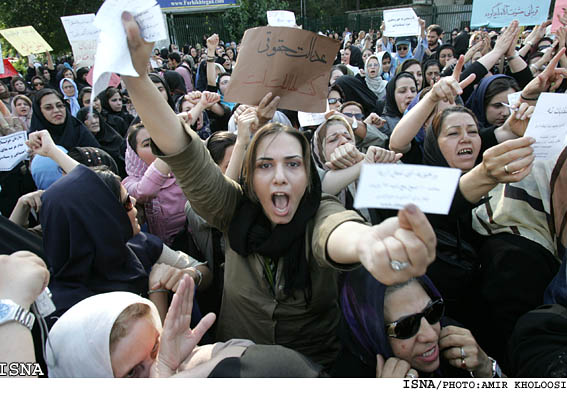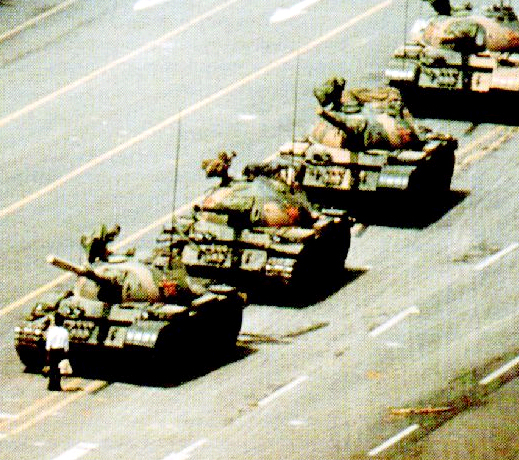
Do you have an irrational fear of weapons? Do you maintain a moral equivalency between those who employ the force of arms, be it for liberty or subjugation? Are you a communist or kleptocrat dictatorship, formerly or prospectively in the space race? Step forward and lay your specious arguments against scientific advancement towards orbital militarization, so that they may be met and defeated.
Space weapons are a variation on an old theme — free nations hold an advantage that is only lost through forfeit. Who would contrarians have rather seen fly jets over the Atlantic first: Pan American Airlines or the Luftwaffe? Yet who began the technology first?
Some note was made of South Carolina Senator Lindsey Graham announcing on a Sunday morning television program that the terrorist combine in Iraq was "alive and well," though the value of his statement seems derived mostly from the man's party and southern origins — a Republican ally of President Bush included in his generally optimistic assessment a provocative line or two, and that is worth quite a lot to those fixed opposite the White House. Less consideration is given to the veracity of Graham's phrase, "alive and well." By whose accounting? The day's victims of terrorism were described in part by the Associated Press as "child vendors" and "pensioners." Thugs in the extreme west of the country harrassed a border town conspicuously enough to catch American attention and the following match of skill and strength took place:
[T]errorists [in Karabilah] set up a barricade on a main road to the city and were threatening Iraqi civilians. The seven precision-guided air strikes began at 11:40 a.m., and are estimated to have killed approximately 40 terrorists. There have been no Marine casualties. The Coalition aircraft, fighter jets and attack helicopters from the 2nd Marine Aircraft Wing (Forward) attacked the terrorist compound and surrounding area targeting the armed men.There are no reports of civilian casualties or collateral damage.
Forced to operate in the respective concealments of rural and heavily urban environments, terrorists failed to prevent another reinstitution of normalcy: Baghdad's Al-Sha'ab Stadium has reopened, with commensurate security measures and decades-overdue renovations, to host regular matches for Iraq's new soccer league.
More Republican congressmen have, with Graham, been taken partially out of context, primarily by the selection of and order in which their statements are reported. Add the transcripts up for a sum of what we knew: Iraqis and Allies are fighting against a terror force led by Iran and Syria, and facilitated by Ba'athists. Strip away the elite media's exclusion of news unrelated to violence and gainsaying about "the real Iraq" becomes very ironic, a buckling enemy apparent.
ALSO: In London, Ahmad's survey of news includes two more contradictions of terrorist well-being. Would tribes break tradition unless Baghdad gave them convincing reasons? Would an arm of the United Nations enter a country from where some are demanding an exit?
PERSPECTIVE, RECONSIDERATION: An Indian news agency published a brief on Al-Sha'ab. From Baghdad, Ali Fadhil — who was initially skeptical of the major Iraqi security operation in Baghdad, alternatively known as Lightning and Thunder — writes of success that is both empirical and witnessed firsthand. Setting a poignant comparison between Saddam's corrupt, uniformed roughnecks and the new republic's G-Men, Ali judges police performance as imperfect but effective — and another step forward in Iraq's democratic self-determination.

From Banafsheh Zand-Bonazzi, the Iranian Student News Agency is reporting a women's protest — for democracy and equality — at Tehran University led by poet Simin Behbahani.
MORE: ISNA has a second set of photographs.
MAINSTREAM: The New York Times reports. (Link changed to the Taipei Times, which does not force readers to register. Apologies.)
The Iranian people are "demonstrating their hatred for the [theocratic fascist] regime and their desire to be free," says Michael Ledeen. Earlier today, the Student Movement Coordination Committee for Democracy in Iran reported pro-democracy riots across the country, held after soccer games:
The celebration gatherings turned, right after the end of the game, into massive shows of popular defiance and rejection of all symbols of the Islamic regime. The National exasperation is to the point that male demonstrators had in most occasions to create security belts around maverick females who persisted to stay and "fight for freedom."...In the Greater Tehran's areas of Madar, Hafthose, Rey, Saadat Abad, Guisha, Sadeghie, Vali-e Asr, Eslamshahr, Tajrish and Azadi heavy damages were inflicted to public materials and buildings. Windows of tens of buses and offices or commercial entities affiliated to the Islamic regime were smashed by demonstrators. Some of the Capital's avenues, such as, Azadi or Enghelab were covered with pieces of broken glace.
Most of regime's propaganda devices, such as, its sham electoral propaganda were brought down or set on fire. Several militiamen were also injured in those clashes and several patrol vehicles or Militia's motorbikes were damaged or torched, such as, in Eslamshahr which is a poor suburb of Tehran.
The Iranian people are our friends, our allies. They need America's help.

A different scale for globe and ring: Saturn and Rhea.
Two weeks ago the Cassini space probe detected what appeared to be a "red spot" on Saturnine moon Titan, an area on the surface with a unique infrared spectrometer response. Four possibilities were considered: "surface coloration, a mountain range, a cloud, or a hot spot."
Today, NASA is announcing the discovery of a methane-pumping, Titanian ice volcano, observed geologically and thermatically.
Howard Dean's inimitably repulsive advocation of the Democratic Party has been a topic of conversation over at National Review's Corner, and a reader has chided all the talk of the former Vermont governor's very short suit.
Kathryn Lopez takes this criticism as overanxious — "Hush, hush," she writes — but the correspondent has a point. Conventional wisdom seems to hold the MoveOn fringe totally responsible for Howard Dean's nomination, when it should be obvious that the Clintons could have blocked Dean or at least extracted public concessions from him. Instead, Hillary and Bill stepped aside — making possible Dean's spectacular demonstration of the Peter Principle. While it's hardly beneficial for major party figures to dismiss their party spokesman as someone who does not speak for the party, Dean's opponents in the Democratic Party, from Joseph Biden to Bill Richardson to John Edwards, are separating themselves from Dean and effectively walling him into his own, little brick-lined cell. If they succeed, Dean will politically immolate without significantly damaging the party; Democrats like Hillary Clinton simply need to step back and let Howard Dean be Howard Dean. At his current clip, Dean could be at his weakest shortly after 2006, the perfect scapegoat for a few painful but sustainable losses.
DIFFERENT ANGLES AND POSTSCRIPT: David Freddoso sees Dean yanked offstage sooner than 2006; while that might spare Democrats a few seats in state and national elections, and will certainly leave Republicans one less thoughtless opponent, Dean's career would not be as fully scuttled as his competitors wish. Rush Limbaugh, on the other hand, believes that Howard Dean is the legitimate pick from the Democratic Party's growing nihilist faction, an avatar for leftism's secular, relativist, anti-nationalist and anti-capitalist self-estrangement from America.
Let me clarify: the Democrats are in a little more trouble now than nearly one year ago, whether an incendiary man like Dean is the party's most popular or if his direct challenge to another faction is worth the rather severe plan I've suggested above. Removing Dean will not solve the party's fundamental, ideological dilemma.
The left's painting over recent history and current events has begun. Debating Christopher Hitchens, Germaine Greer waved off the liberation of Iraq as redundant, characterizing the Ba'athists as "in a process of self-destruction anyway."
Unfortunately for Greer, who offered a passel of excuses for perpetuating tyranny in her time with Hitchens, Iraqi democracy faced a millenia-old authoritarian society in which the strongest native or foreign thug — following a laughably improbable Ba'athist collapse — would prevail. So, a prediction: when Iraq is a mostly secure nation, expect unrepentant leftists to mourn the end of the terrorist invasion as if it were a patriotic last stand, while they admonish Iraqis and Allies for a campaign variously and disgracefully tied to adjectives like "heavy-handed," "brutal" or "draconian."
Editor-in-Chief of American Enterprise magazine Karl Zinsmeister, who has regularly visited Iraq since the deposition of Saddam Hussein to gauge Iraqi temperament, trajectory and progress was this morning's guest on Bill Bennett's Morning in America radio program. "It's still messed up," said Zinsmeister of Iraq, "but less so every time I go there." He noted remarkable changes having taken place over the past year. Baghdad's Sadr City, where the gangs of Iran-backed Muqtada al-Sadr harrassed Allied and Iraqi soldiers in April and August of 2004, the authorities' chief concerns today are traffic jams and water treatment. Haifa Street, the capital city's lethal Hogan's Alley, has been largely assumed by Iraqi security forces and in Zinsmeister's opinion "reclaimed," no small thanks to knowledge and insight impossible to foreigners. "Iraqis can pick out a man's Syrian accent instantly, and will ask him about his business, whereas Americans would just give him a 'Salam' and let him on his way."
Zinsmeister corroborates the observations of Iraqi fortitude found here and elsewhere: "the Iraqis are looking for a fight," he says, and while the enemy is increasingly confined to soft-target and indirect bombing operations Iraqis are angry, growing in confidence with every victory and more likely to be aggressive than politically compromised Americans and multinational soldiers. As Captain Duane Limpert, Jr. wrote in a recent letter home, "The main concern now among most Iraqis is not security, but jobs followed by basic services. Obviously, people are scared and concerned about safety, but they are less intimidated now." That in turn follows recent signs of democratic normalcy in the country.
What is critical to ensuring a very visibly approaching success? Here, all agree: American commitment.

I enjoy U2 musically and often spiritually — never politically, as every time I risk listening to the song "Love and Peace or Else" I think of nothing but desperate scenes from Beijing 1989, likely the last association Bono and the boys would possibly make.
Sixteen years silence. Sixteen years waiting.
IN MOTION: The lone man's battle with armor is the third video link from the top.
For William F. Buckley, it's personal:
On January 5, 1973, Howard Hunt, an old friend and my sometime boss in the CIA, came to see me, accompanied by one of his daughters (my goddaughter, as it happened). He told me the appalling, inside story of Watergate, including the riveting news that one of the plumbers was ready and disposed to kill Jack Anderson, the journalist-commentator, if word came down to proceed to that lurid extreme.I took what I thought appropriate measures. I do not believe Jack Anderson's life was actually imperiled, but meanwhile, in an adjacent theater, Mark Felt, posing as an incorruptible agent of the Federal Bureau of Investigation, was advancing his own drama. And now he wants some money for it.
I have no love for Richard Nixon but this seems to be the smartest take on it: heroes pierce a villain's heart from the front. Face the man who promotes his convictions, for profit or for loss, against the other man, who slides them under a door; and you find that it couldn't possibly be a match. A shame that Firing Line is long off the air, Mr. Buckley is long since retired from public life and recently divested from executive commentary in National Review, and Deep Throat past one enfeebling stroke. If he could be on the televised receiving end, Mr. Felt's secondhand canonization would not last much longer than his abruptly and artificially shortened interview.
